Table of Contents
Buyer Overview
AI is going beyond automating responses for Customer Service. It is creating intelligent systems to seamlessly handle complex workflows, integrate with existing business systems, and provide the flexibility to adapt as your business evolves. Customer Service has most adopted AI to reduce up to 30% of their costs. Gartner identifies that 80% of customer service and support organizations are applying generative AI technology in some form to improve agent productivity and customer experience.
According to Ayudo's platform performance data, the AI-powered customer support agent platform delivers:
- 42% faster resolution with agent productivity improvements
- 60% better deflection rate for routine inquiries
- 25% lower cost per resolution through intelligent automation
- 24/7 availability without proportional staffing increases
The most successful implementations combine advanced AI capabilities with thoughtful human oversight, creating support experiences that feel both efficient and genuinely helpful.
Key Challenge: Many businesses struggle with implementation complexity, integration challenges, and finding solutions that truly can create their unique workflows and impact while reducing deflection rate.
Understanding Different Types of AI Customer Service Solutions
Conversational AI Platforms
Modern conversational AI goes beyond simple chatbots to provide intelligent, context-aware interactions across multiple channels with sophisticated workflow automation.
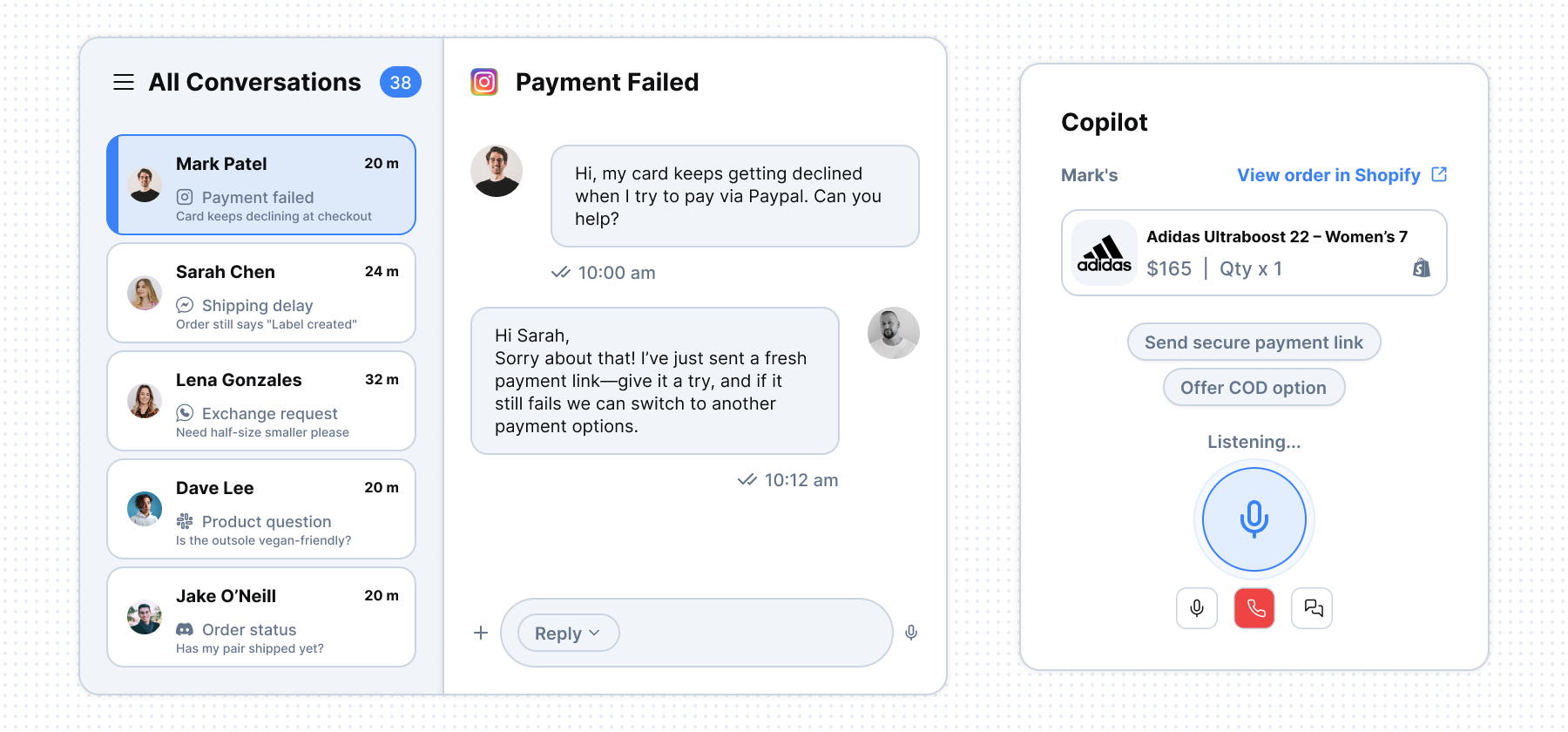
Core Capabilities:
- Multi AI Agent Workflow automation and smart routing
- Multi-turn conversation handling with context retention
- Integration with business systems and knowledge bases
Best For: Companies needing comprehensive customer service automation with complex workflow requirements
Agent Assist & Copilot Systems
AI-powered tools that enhance human agent productivity through real-time suggestions, knowledge retrieval, and conversation insights.

Core Capabilities:
- Real-time response recommendations
- Knowledge base search and retrieval
- Conversation analysis and sentiment detection
- Performance analytics and coaching insights
Best For: Organizations wanting to enhance human agents rather than replace them.
Omnichannel Orchestration Platforms
Unified platforms that manage customer conversations across all channels with consistent AI-powered assistance and routing.
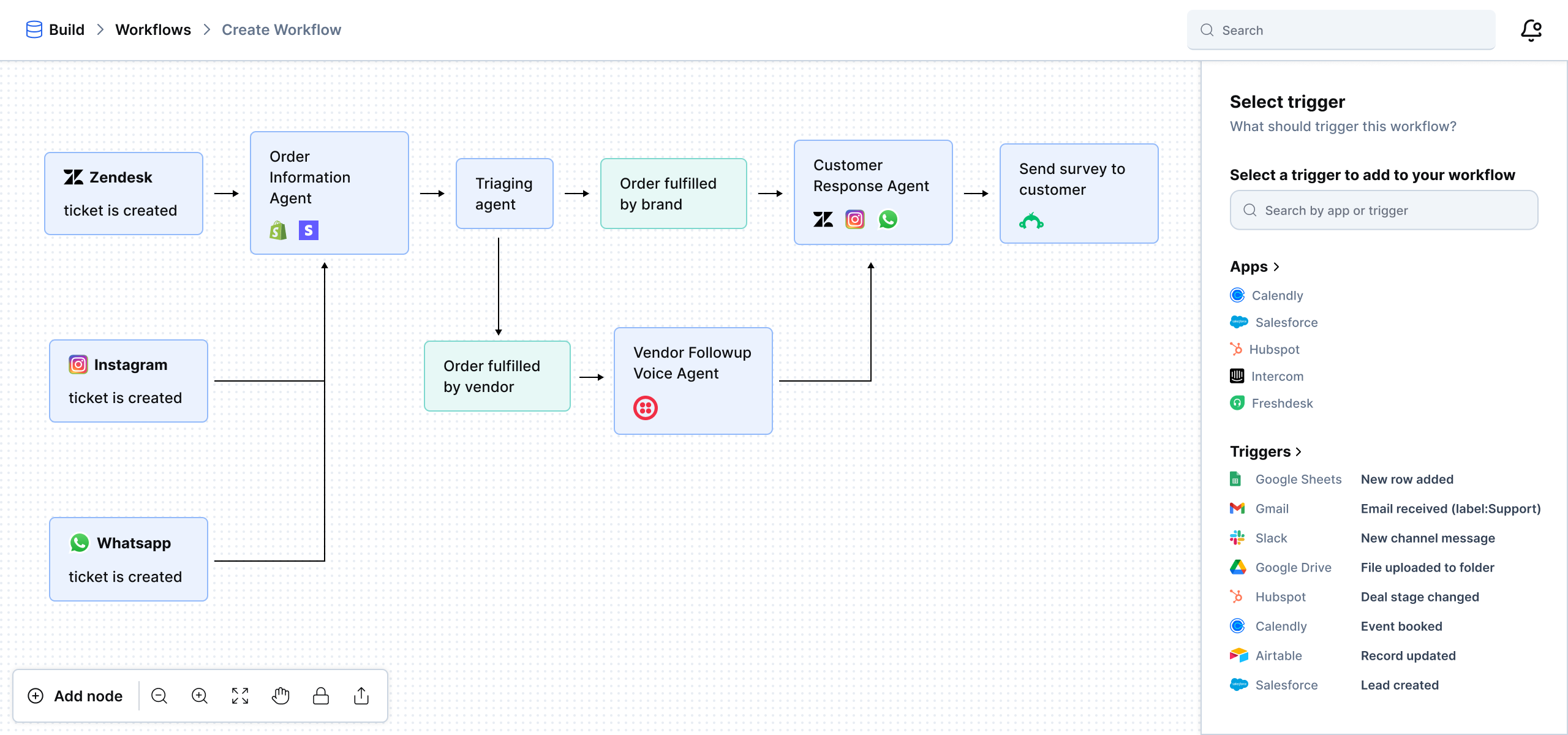
Core Capabilities:
- Unified inbox for all customer interactions
- Cross-channel context preservation
- Intelligent routing and prioritization
- Unified reporting and analytics
Best For: Businesses managing high volumes across multiple communication channels.
Voice AI Systems
Advanced speech recognition and natural language processing for voice-based customer service automation.
Core Capabilities:
- Natural language understanding for voice
- Voice AI Agents
- Call routing and IVR automation
- Voice-to-text transcription
- Integration with existing phone systems
- Call Analysis
Best For: Companies with significant phone support volumes
Head-to-Head Comparison: Top AI Customer Service Platforms
Advanced
Basic
Basic
Limited
Limited
Advanced (2700+ apps)
Basic
Limited
Limited
Limited
Limited
Real-time sync
Basic
Basic
Basic
Advanced
Advanced
Proactive suggestions
Basic
Limited
Limited
NA
NA
Basic
Basic
Advanced
Basic
Basic
Basic
Yes
Yes
Yes
Neutral
Mid-segment
Limited
1. Ayudo - Agentic AI Platform
Best for: Companies wanting comprehensive workflow automation with minimal setup time
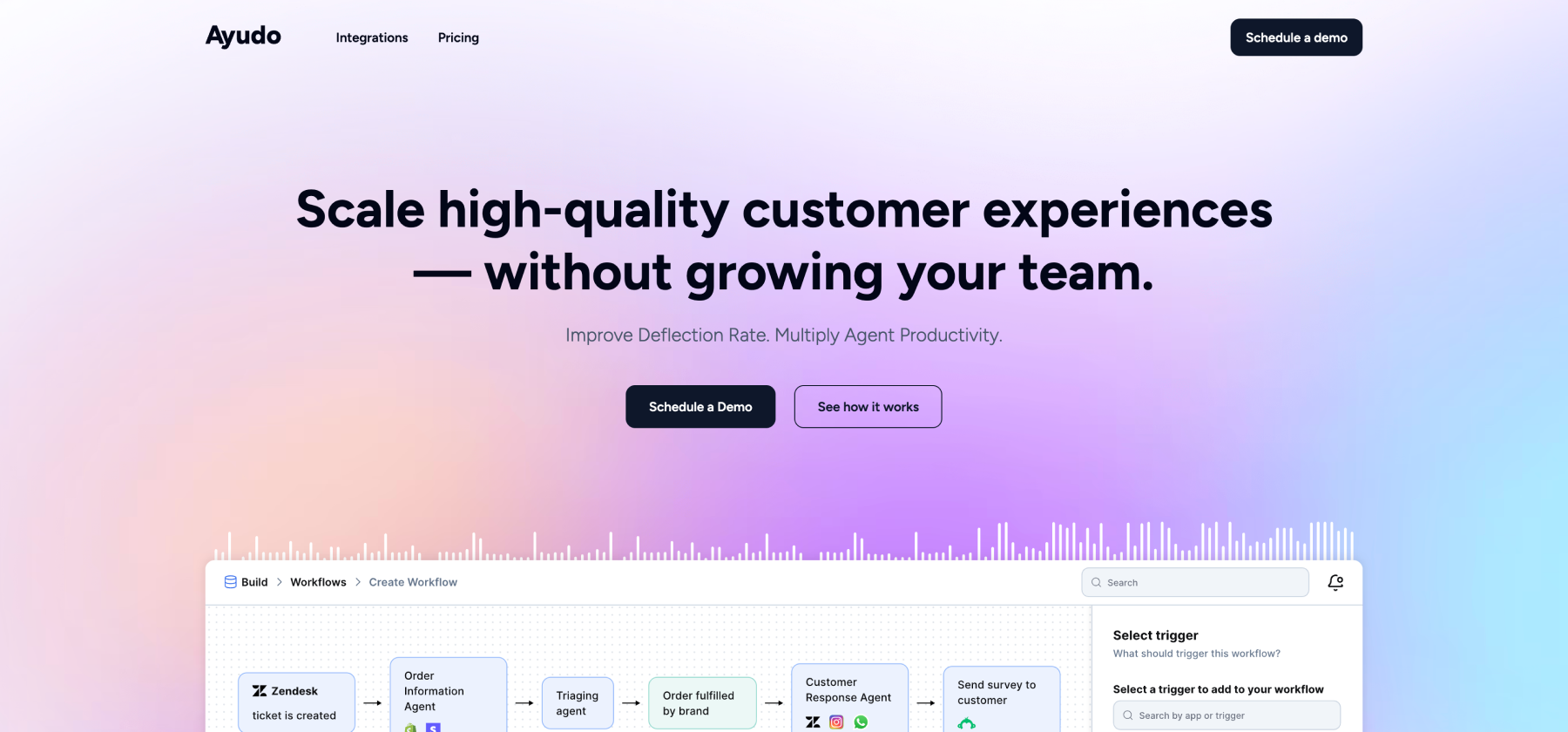
Strengths:
- Launch trained AI workflows in under 60 minutes
- Advanced multi-AI agent collaboration
- Extensive integration ecosystem (2700+ apps)
- Real-time external knowledge base synchronization
- Voice + text specialized agents
- Enterprise-ready from day one
Considerations:
- Newer platform with growing ecosystem
- Pocket-friendly pricing model
2. Intercom - Conversational Customer Service
Best for: Fast-growing companies focused on basic conversational support

Strengths:
- Strong conversational interface
- Good automation for common queries
- Integrated messenger platform
- Solid mobile experience
Limitations:
- Limited workflow automation capabilities
- Higher costs as you scale
- Basic integration options
- Text-focused AI agents (Voice AI Agents are not supported)
3. Zendesk - Traditional Helpdesk + AI
Best for: Established companies with existing Zendesk infrastructure
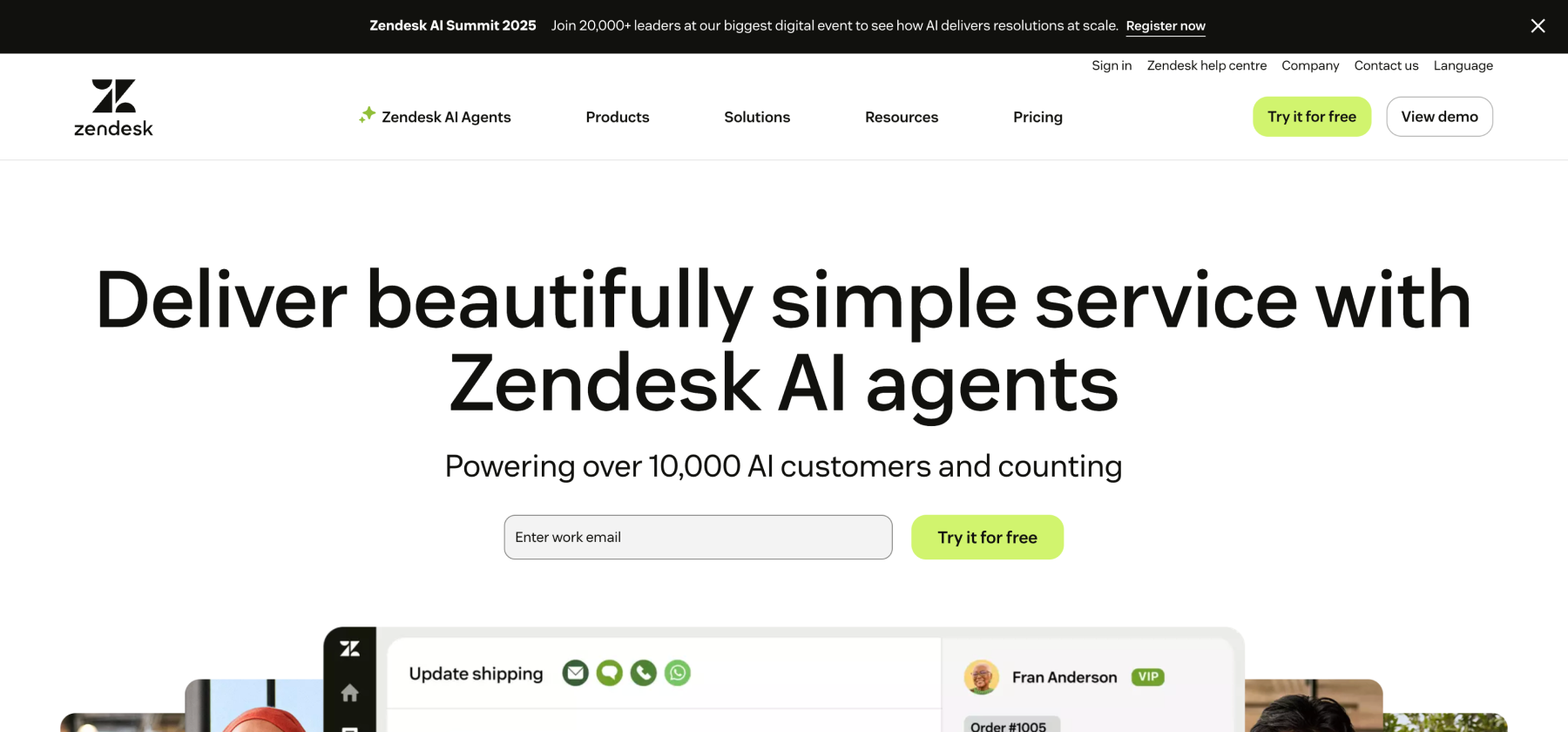
Strengths:
- Mature platform with extensive features
- Good reporting and analytics
- Large ecosystem of apps
- Comprehensive knowledge base tools
Limitations:
- Complex setup and configuration
- AI features feel bolted-on and limited
- Limited modern workflow automation
- Higher learning curve
- Expensive
4. Decagon - AI-First Automation
Best for: Companies wanting fully automated customer service

Strengths:
- Advanced AI conversation capabilities
- Minimal human intervention required
- Good for high-volume, routine inquiries
Limitations:
- Limited human-AI collaboration features
- Newer platform with fewer integrations
- May struggle with complex edge cases
- Custom pricing and implementation
- Limited support for multi agent workflows
5. Sierra - Conversational Commerce AI
Best for: E-commerce companies focusing on sales-driven support
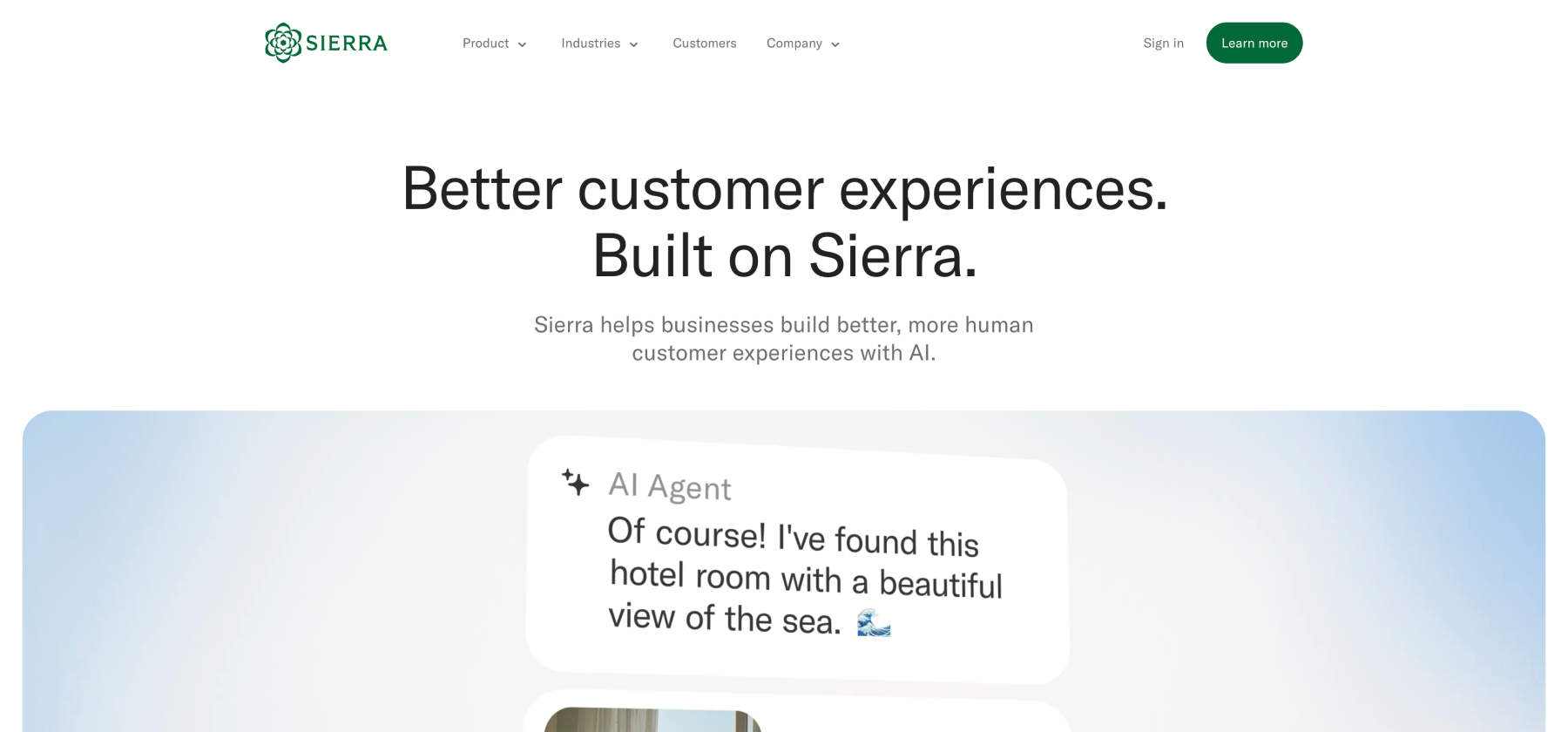
Strengths:
- Commerce-focused conversation flows
- Good product recommendation capabilities
- Integration with e-commerce platforms
Limitations:
- Limited general customer service features
- Narrow focus on commerce use cases
- Complex enterprise implementation
- Limited support for multi agent workflows
Key Use Cases for AI Customer Service
Customer Support Automation
Goal: Handle routine inquiries automatically while seamlessly escalating complex issues
Best Platform: Ayudo
- Multi-AI agent collaboration handles different query types
- Smart escalation to human agents with full context
- Real-time knowledge base updates
- Workflow automation for common processes
Success Metrics:
- Improved deflection rates for routine inquiries (Ayudo reports over 60% improvement)
- Reduced cost per resolution (Ayudo reports 25% reduction)
- Enhanced customer satisfaction scores
Agent Productivity Enhancement
Goal: Empower human agents with AI assistance and streamlined workflows
Best Platform: Ayudo
- Proactive copilot suggestions during conversations
- Agent-centric voice assistant (talk-to-type)
- Smart filters and sentiment analysis
- Integration with existing helpdesk systems
Success Metrics:
- Faster resolution times (Ayudo reports 42% improvement)
- Reduced agent training time
- Lower agent burnout and turnover
Omnichannel Experience Management
Goal: Provide consistent experiences across all customer touchpoints
Best Platform: Ayudo
- Single inbox for all communication channels
- Context preservation across channels
- Unified customer conversation history
- Channel-specific optimization
Success Metrics:
- Improved customer experience consistency
- Reduced channel switching friction
- Higher first-contact resolution rates
Voice Customer Service Automation
Goal: Automate voice-based support with natural conversation capabilities
Best Platform: Ayudo
- Specialized voice AI agents
- Integration with existing phone systems
- Voice-to-text capabilities with agent handoff
- Multi language support
Success Metrics:
- Reduced call center costs
- Faster call resolution
- Improved customer satisfaction for phone support
If there are any sector or industry based use cases to be added, please provide information here.
Implementation Best Practices
Pre-Implementation Planning
Define Success Metrics
- Establish baseline measurements for resolution time, customer satisfaction, and costs
- Set realistic improvement targets based on your current performance
- Create measurement frameworks for ongoing optimization
Audit Current Processes
- Map existing customer service workflows
- Identify high-volume, repetitive tasks for automation
- Document current pain points and escalation procedures
Prepare Knowledge Resources
- Audit and organize existing knowledge base content
- Identify gaps in documentation
- Plan for ongoing content maintenance and updates
Deployment Strategy
Phase 1: Foundation (Week 1-2)
- Set up core integrations with existing systems
- Configure basic workflow automation
- Train AI models with historical data
- Establish escalation procedures to bring humans into the interaction and process
Phase 2: Testing (Week 3)
- Deploy to limited customer segment
- Monitor performance closely
- Gather feedback from agents and customers
- Refine workflows based on real interactions
Phase 3: Optimization (Week 4)
- Expand to full customer base
- Implement advanced workflows
- Fine-tune AI responses and routing
- Scale based on performance data
Content Management Best Practices
Knowledge Base Organization
- Structure content by customer journey stages
- Use consistent formatting and terminology
- Implement version control for updates
- Create feedback loops for continuous improvement
Workflow Design Principles
- Start with simple automation and gradually add complexity
- Design clear escalation paths to human agents
- Test edge cases thoroughly before full deployment
- Build in monitoring and alerting for failure scenarios
ROI Calculation Framework
Cost Savings Analysis
Annual Savings = (Current Agent Costs × Automation Rate) - Platform Costs
ROI Percentage = (Annual Savings / Total Implementation Cost) × 100
Example Calculation:
- Current agent costs: $500,000/year
- Estimated automation rate: 40% of inquiries
- Projected annual savings: $200,000
- Platform + implementation costs: $75,000
- Projected ROI: 167% in first year
Efficiency Metrics to Track
- Deflection Rate: Target high automation for routine queries (Ayudo reports over 60% improvement)
- Resolution Time: Aim for significant reduction (Ayudo reports 42% improvement)
- Customer Satisfaction: Maintain or improve current scores
- Agent Productivity: Focus on meaningful improvement in tickets handled (Ayudo reports 25% cost reduction)
Frequently Asked Questions
Implementation & Setup
Modern platforms like Ayudo can have workflows running in under 60 minutes, while traditional solutions may take weeks or months. The key is choosing platforms designed for rapid deployment.
Advanced platforms now offer no-code configuration, allowing business users to set up and maintain workflows without developer involvement. Look for platforms with drag-and-drop workflow builders and pre-built integrations.
Leading platforms support extensive integrations including CRMs, helpdesks, and business applications. Ensure your chosen platform has native connectors for your critical systems.
Performance & ROI
Results vary based on implementation quality and use case complexity. For reference, Ayudo reports 42% faster resolution times, over 60% better deflection rates, and 25% lower cost per resolution for their customers.
Track key metrics including deflection rate, resolution time, customer satisfaction scores, agent productivity, and cost per resolution. Establish baselines before implementation for accurate comparison.
Customer Experience
When implemented well, customers often prefer AI for routine inquiries due to instant responses and 24/7 availability. The key is transparent communication and seamless escalation to humans when needed.
Modern AI platforms use customer data and conversation history to provide personalized responses. Integration with CRM and order management systems enables contextually relevant support.
Enterprise Considerations
Essential features include SOC 2 compliance, SSO integration, role-based access control, data encryption, and audit logs. Enterprise-grade platforms offer these capabilities from day one.
Choose platforms with built-in compliance features for your industry (HIPAA, GDPR, etc.). Ensure proper data handling, retention policies, and audit trail capabilities.
This guide was last updated in 2026. For the most current information on AI customer service platforms and implementation strategies, consult with solution providers directly. hi@ayudo.ai





